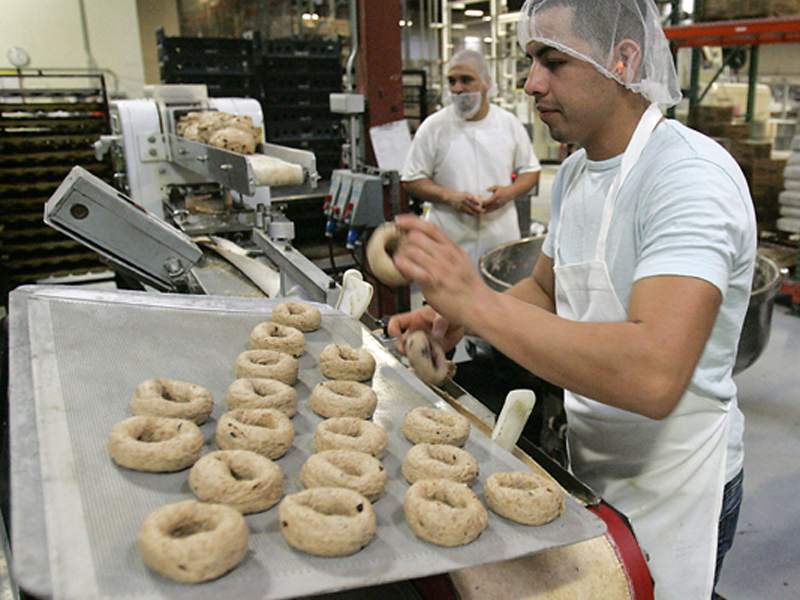Opening your bakery: tips for getting started
Creating a bakery, and becoming a local shopkeeper, offering fresh products, this is what more and more entrepreneurs are aiming for. Out of love and passion for a profession, out of a desire to provide a quality service, there are many reasons to open a bakery. Whether you already have a first experience or are new to the bakery industry, follow our guide to get started.
The first steps before opening her bakery
Starting and creating your own bakery does not require any particular know-how. This idea is wrong. Making bread, and good food is a profession. However, even if you have no experience, this mastery is acquired. Before starting, it is therefore essential to document yourself and follow a complete training. The reference in the field remains the CAP of Boulanger Pâtissier, an essential to master the techniques and claim to make your own bread one day. The normal course of the CAP is a 2-year alternating course. For adults undergoing retraining, 4-month training courses that prepare for the CAP exist. This short course is intended for people who have no knowledge of baking. If you are not in work, please note that Pole Emploi can cover part of the cost.

The professional baker’s certificate (which is prepared in 2 years) is an additional training that provides useful knowledge for people who want to set up their own business, particularly in management and financial management. So much for the “school” aspect, but becoming a baker-pastry maker is not just a matter of graduation. For a project to be viable, a preliminary market study is essential. As with any business creation or takeover project, a business plan must be drawn up. This reference document will help you to see things more clearly, give direction to the project, and give banks better visibility. A visit to the Chamber of Trades will help you to prepare yourself well.
A bakery from A to Z: from equipment to staff
Do you have the knowledge to open your bakery? Do you have a vision of your human and material needs? A bakery requires hands: a baker / pastry worker, even an apprentice, but also sales staff. To sell cereal chopsticks and almond croissants, you will not be able to multiply. Going it alone is impossible.
On the material level, the equipment necessary for a bakery-pastry shop is important. Machines (bread ovens, sourdough cabinets, shaping machines, rolling mills, kneading machines) as well as storage units (refrigerators) represent a significant budget. Depending on your needs, and the size of your store, models are adapted. However, physical investment should not be underestimated, and must take into account future developments. Don’t forget the less expensive equipment, but which makes the bill go up: stick plates, gloves, brushes, flour shovels. You have to think of everything. On the customer side, display cases, displays, labels and lighting systems are essential. Here again, prices adapted to all projects are offered.
In addition to being a connoisseur of techniques and a well-equipped trader, the baker-pastry maker is above all steeped in passion, envy and sharing. This desire cannot be learned in school textbooks, nor can it be bought in the shelves of a large specialized store.
Which brands should I choose to become a Baker Franchisee?
To become a baker and open your own franchise bakery, many networks are available. Here is a selection of networks that are currently recruiting franchisees throughout France (do not hesitate to consult our page on the advantages of franchising if you are not yet very familiar with the interests of this type of business creation):
You want to open your bakery but don’t know how to do it? Where to start?
The required training
To obtain the title of “Bakery”, it is necessary that the manager, an employee or an employee of the company has obtained the professional qualification of artisan baker.
The most well known training is the CAP Boulanger. It takes two years and allows you to learn how to produce and present bread and pastries in compliance with the quality, hygiene and safety standards in force.
Following this training, you can take a Supplementary Mention in one year to specialize and gain in competence.
For adults undergoing retraining, there are accelerated courses to take this CAP in 4 or 6 months.
It is also possible to pass a Professional Baker’s Certificate, in 2 years, to acquire the knowledge necessary for the management and the management of a bakery.
If you do not have a diploma in business management (Bac +2 in management, master’s degree,…) or more than three years’ experience in business management, you must undergo an introductory internship before you can be registered in the trades directory. The objective of this internship is to train you in accounting and the economic, legal and social environment of the craft business. The training is organised by the Chamber of Trades of your department.

The definition of the project
Before you start looking for a location, it is essential to take the time to define your project precisely. This reflection should focus on:
The identity of the bakery: What name? What slogan? What slogan? What logo? What kind of interior atmosphere?
The products on offer: Which breads and pastries? What pastries? Do I offer light food products (sandwiches, pizza parts, salads)?
Originality: What makes my added value? How do I differentiate myself from the competition? What will I highlight in my communication?
Asking all these questions will help you to know what you are really looking for in your business. You can then start looking for a premises/business to acquire.
Site selection and market research
The choice of location and the corresponding catchment area is crucial for a bakery.
To ensure that your location is relevant, you will need to conduct a market research study. The objective of this study will be to measure the relevance of your project: with the chosen location, how many customers will I have each day? What will be the profile of these customers? Their average basket?…..
You will then have a better knowledge of your location, your competition and your customers. This will help you define your strategy and make the first financial forecasts for your business.
Administrative procedures
You will first have to choose your legal status. To do this, you need to ask yourself some questions
Do I want to separate my personal assets from those of the company?
Will I bring money personally?
Do I undertake alone or do I partner?
What tax regime do I want to adopt?
…
Once you have answered these questions and found the legal status that best suits your situation (SARL ? EURL?….) you must draft the articles of association of your company and then register them with the tax authorities.
You can then deposit the funds from your share capital that will be released when the company is registered.
Check with the INPI to find out if your bakery’s name is not already a registered trademark of a company in the same sector, in which case it will have to be changed.
Finally, once all these steps have been completed, you can register in the job directory (the management initiation course must have been completed before this registration).
The drafting of the business plan and the search for funds
If you cannot provide the necessary funds to open your bakery yourself, you must ask for funds from banks or investors.
To do this, you must present them with a business plan that details your project, your team, your market research and your financial forecasts. The objective of this business plan is to show that your business is viable and profitable and that you will be able to repay your loan.
To help you in this writing, we have created a business plan model that specifically responds to the requests of bankers and investors for the opening of a bakery. You can find it here.
Conclusion
Take the time to think about each of these steps. A poor market research, a bad choice of legal status or a poorly prepared business plan can jeopardize the opening and management of your bakery in the long term. So no precipitation.
